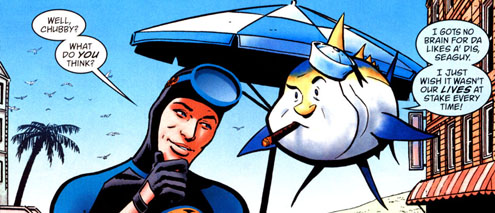“But… it seems so pointless. The rules so arbitrary.”
This grievance is uttered by none other than Death himself at the begining of Grant Morrison and Cameron Stewart’s Seaguy (DC/Vertigo, $9.95 US), but it’s not until the very end of the book that these words of defeat and resignation begin to ring true.
But let’s not get ahead of ourselves…
So, the grim reaper is pissed off because he has just lost a routine game of chess to Seaguy, our would-be hero in scuba gear, and his cigar-smoking fish sidekick, Chubby Da Choona. They used the color-blindness of their opponent to their advantage and moved one of Death’s own pieces against him for the win (death is color-blind, get it?!). Of course, conventional logic dictates that if one were really color-blind, black and white would be the only things they could tell apart, but if chess games with the reaper and a cigar-smoking fish sidekick weren’t indication enough, this book runs almost entirely on metaphors and non-sequiturs.
So, adjust your brains accordingly.

The bright and sunny dystopia of New Venice is a funhouse mirror reflection of our own society, in which corporations rule the world, and choice is merely an illusion. An apparent anomaly in this world, our melancholy protagonist strolls through his daily routine longing for a life of adventure and uncertainty, but since the ultimate battle with the evil incarnate Anti-Dad, there simply is no evil left to be fought – or so everyone is led to believe. The defeat of Anti-Dad, for which many super-heroes gave up their lives, and which ushered in a new era of peace and prosperity, where the remaining heroes firmly believe they are no longer necessary – despite mounting indications to the contrary – mocks the idea of successfully defeating concepts like evil and terrorism, and echoes our former president’s “Mission accomplished!” speech rather loudly.
It also makes Seaguy’s attempts to prove himself worthy of the bearded warrior princess She-Beard that much more difficult. Trapped in an endless cycle of apathy and corporate manipulation (and free of the burden of a very long attention span), no one seems to care about children being abducted, or deadly meteorites falling from the sky. But when Xoo, a brand new form of nourishment that suddenly EVERYTHING seems to be made out of, becomes sentient and is promptly regurgitated by Seaguy, our hero and his piscine friend find themselves surrounded by soldiers of the omnipresent Mickey Eye corporation who are demanding its handover. This triggers a chain of events that finally thrusts Seaguy out of his ennui and into a picaresque adventure that takes him octopus-herding on the Easter Islands, fighting mechanical bees on the lost continent of Atlantis, and getting kidnapped by Egyptian jackal-men guarding the mysteries of the Moon.
And then things get REALLY weird.
Grant Morrison’s show-don’t-tell approach may not work for everyone, but keeping in line with his previous work, the more you are willing to invest in piecing together the bits of seemingly throw-away dialogue, and interpreting the countless visual clues, the greater your appreciation and understanding of the material is probably going to be. For example, the constant images of children being abducted, coupled with one of Xoo Industries employees bearing a very notable resemblance to the Child Catcher (the creepy kid kidnapper from the 1968 Dick Van Dyke vehicle Chitty Chitty Bang Bang), lead me to believe that processed children are probably one of the key ingredients of this popular “foodstuff.” And while the idea of children, or something obtained from children, being fed to the masses to keep them in a suitably child-like, ignorant state may recall the 1973 film Soylent Green somewhat, as commentary on our own dependence on fast-food and the role it plays in keeping the population fat and stupid, it is still as relevant as ever.
Then there is Mickey Eye, standing in for the similarly named mascot of a similarly ubiquitous global corporation, and representing the, well, Disneyfication of media and the corporate takeover of our collective consciousness and imagination. This is probably the most resounding theme of the book, and it is most obviously stated at the very end, which reads as an indictment of mainstream superhero comics for their circular nature and the inflexibility of their status quos. Written shortly after Morrison’s revolutionary run on X-Men was practicaly undone by Marvel in order to restore the product’s recognizability, the ending cannot help but feel like an extended middle finger to their brand management and corporate politics. Things are back to the way they were before, the great adventure has never happened – except, as the hero’s wink to the audience seems to indicate, WE KNOW it has, and that’s all that matters.
Unless, of course, the wink merely signifies that Seaguy is about to resume playing his usual tricks on the hapless reaper, and he really is clueless about his fate, and is doomed to a lifetime of resets, in which case everything really is pointless, the rules are arbitrary, and we are all screwed. I guess we’ll find out tomorrow, when the first issue of the long-awaited sequel (in what is supposed to be a trilogy) finally hits the stands.
I can’t fuggin’ wait.